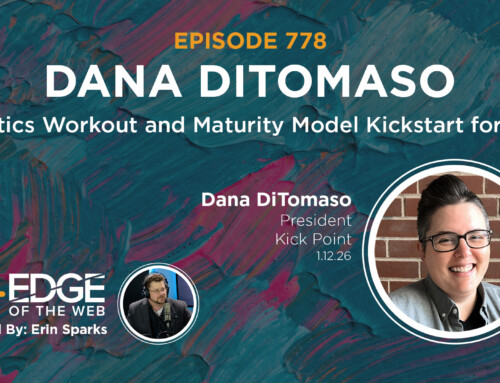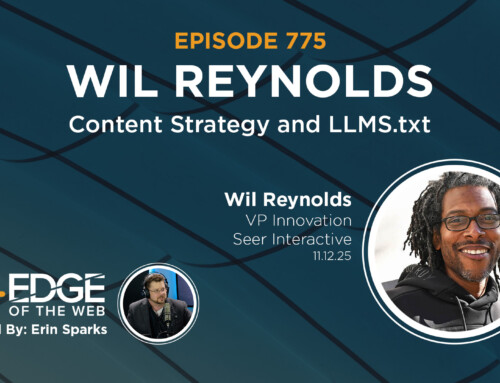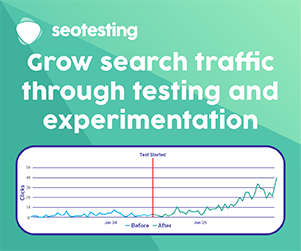In episode 395 of the award-winning EDGE of the Web podcast the conversation between Jason Barnard, the Brand SERP Guy and the Founder/CEO of Kalicube and Host Erin Sparks went deeper into understanding how to go about optimizing your brand SERP. Here’s what we learned:
[00:07:45]
Why the Brand SERP is Critically Important
Jason says it’s useful to think of your brand SERP as your Google business card, because it’s what people are going to see when they search your brand name. It’s important for three main reasons:
- A Main Gateway to Your Brand: Everyone who is in your audience will at some point search your brand name on Google, and may do so with some regularity, and that brand SERP is what they’re going to see every time they search. And that audience includes existing clientele, prospects, journalists, potential hires, and so on. People vastly underestimate how often existing clients search your brand name because it’s often their quickest route to navigating to your site, so they’re seeing your brand SERP quite frequently, and if it’s in good shape then it gives them continuing confidence they’ve made the right choice. If your brand SERP is rubbish, they may jump ship at some point.
- Insight into Content Strategy: For example, if you have a video series but those videos aren’t appearing on your brand SERP in some way, it either means your videos are rubbish or that Google for some reason can’t see or understand that your audience is engaging with that content and finds it valuable.
- A Window into Your Digital Ecosystem: Whatever appears on your brand SERP is what Google thinks the world thinks about your brand. This is important because you don’t have to go spend a boatload of money with a marketing agency to find out what people think about you because it’s going to be reflected right there on your brand SERP. Google’s already doing it for you and they’re doing it on a massive scale you could never hope to replicate. Google your brand name and examine the first 100 results and you’ll see what Google thinks the world thinks about you. But this doesn’t mean Google is right, but if Google isn’t right, then it’s up to you to explain to Google better so they do get it right.
[00:10:08]
Educating Google is How to Optimize Your Brand SERP
The frame of mind you should have about optimizing your brand SERP is this: Treat Google like a child you need to educate. And if you want to educate a child it’s not about forcing things down the child’s throat, it’s about explaining things slowly, patiently, and clearly, along with multiple corroborative sources the child trusts, meaning it’s not just you saying it, but also the grandparents, and the child’s teachers are saying it, and the baker down the street who everyone likes, and so on. But if everyone’s contradicting each other, the child will never get a grip on the concept. You have to educate Google in the same way.
[00:14:21]
Optimizing Rich Site Links on Your Brand SERP
One example of a piece of brand SERP real estate to optimize is rich site links. The main result on the brand SERP should be a link to your main website, but the home page is rarely a user’s final destination, which is why those six or so rich links to specific pages of your website are so important, and yet their importance almost always vastly underappreciated. They take up a significant portion of brand SERP real estate, so you want them to be right.
The rich links are there because they represent what Google thinks are probably the most important areas that will be useful to its users. If there are no rich links, then Google doesn’t understand where its users might want to go on your site, which would indicate your site structure is rubbish. Schema markup is important here to identify important pages clearly to Google, like “About Us” and “Contact Us” and so forth.
One conundrum here for SaaS platform sites is that they often “no-index” the login page for security reasons, and yet that’s one of the pages Google users would absolutely want to see in rich sitelinks for their convenience. In another case, a company had a page that was about the concept of login pages, but Google was including it in rich site links even though it was not the functional login page for the site. This meant the site was not clear enough in explaining to Google which page was functional and which was conceptual.
[00:20:29]
Other Elements of Brand SERP Real Estate
When you’re looking at your brand SERP, Jason notes the three things you’re evaluating is if what’s there is 1) Accurate; 2) Positive, and 3) Convincing. The various elements besides those rich site links to pay attention to include the following:
- Twitter cards/boxes (if applicable). Google loves these because if you’re active on Twitter then there’s going to be a constant flow of new content to surface there.
- Video cards/boxes (if applicable). Same thing. If Google can see a constant stream of fresh, engaging content, then you should have video cards/boxes on your brand SERP.
- Presence on other authority sites: In Jason’s examples, these are links to his author pages on sites like SEMRush, Search Engine Journal, WordLift, and so on. Obviously, you have to have that presence and have it spelled out clearly in your main information repository or “home” about your brand so Google understands the importance of it.
- Knowledge Panel. What you don’t want to do if you have a personal brand, is to try to create or manage your own Wikipedia page, because that usually ends up being deleted. Wikipedia doesn’t trust people to truthfully manage their own page. It’s supposed to be other people writing about a notable person, not you writing about yourself. Of course, those other people might not be getting the facts right either, which is why some people push to have their Wikipedia page deleted so they can control the narrative, and by extension their knowledge panel. The lesson here is not to rely on Wikipedia or Wiki Data for your knowledge panel. Instead, convince Google that your main site is the right place to get information about your brand. Google needs to see a “home” it can rely on for information about your brand, and if you move that “home” you could see your whole knowledge panel disappear in an instant. So you build your site content to show Google this the “home” for information about you and then through the links and schema markup you assemble all the signposts to the corroborative sources to back it up and prove what you’re saying. That’s educating Google like a child!
The two biggest mistakes people make when optimizing their brand SERP are 1) not having established that “home” of information about the brand that you control, and 2) doing a round of optimizing and then thinking you’re done. You have to work on it regularly because things change all the time. Your knowledge panel starts out as a tiny sprout but it won’t stick if you’re not constantly cultivating it and making sure the roots go deep. You have to keep working on it over time. In the end, it’s very simple SEO but very important. Use common sense and educate Google about your brand with credible sources!
























